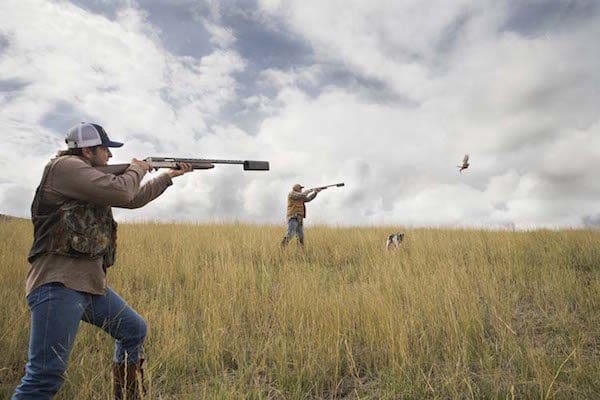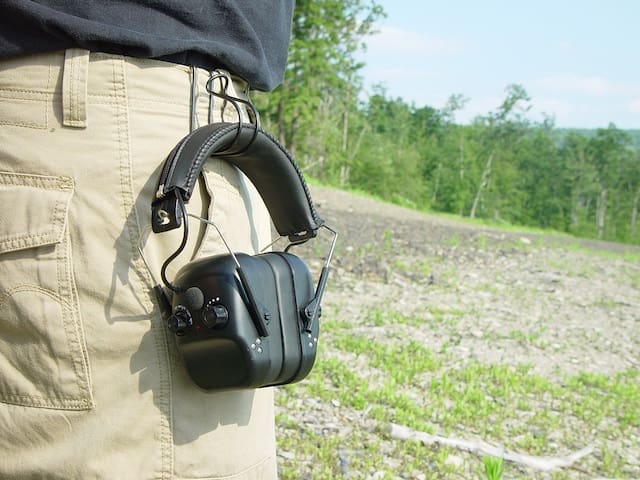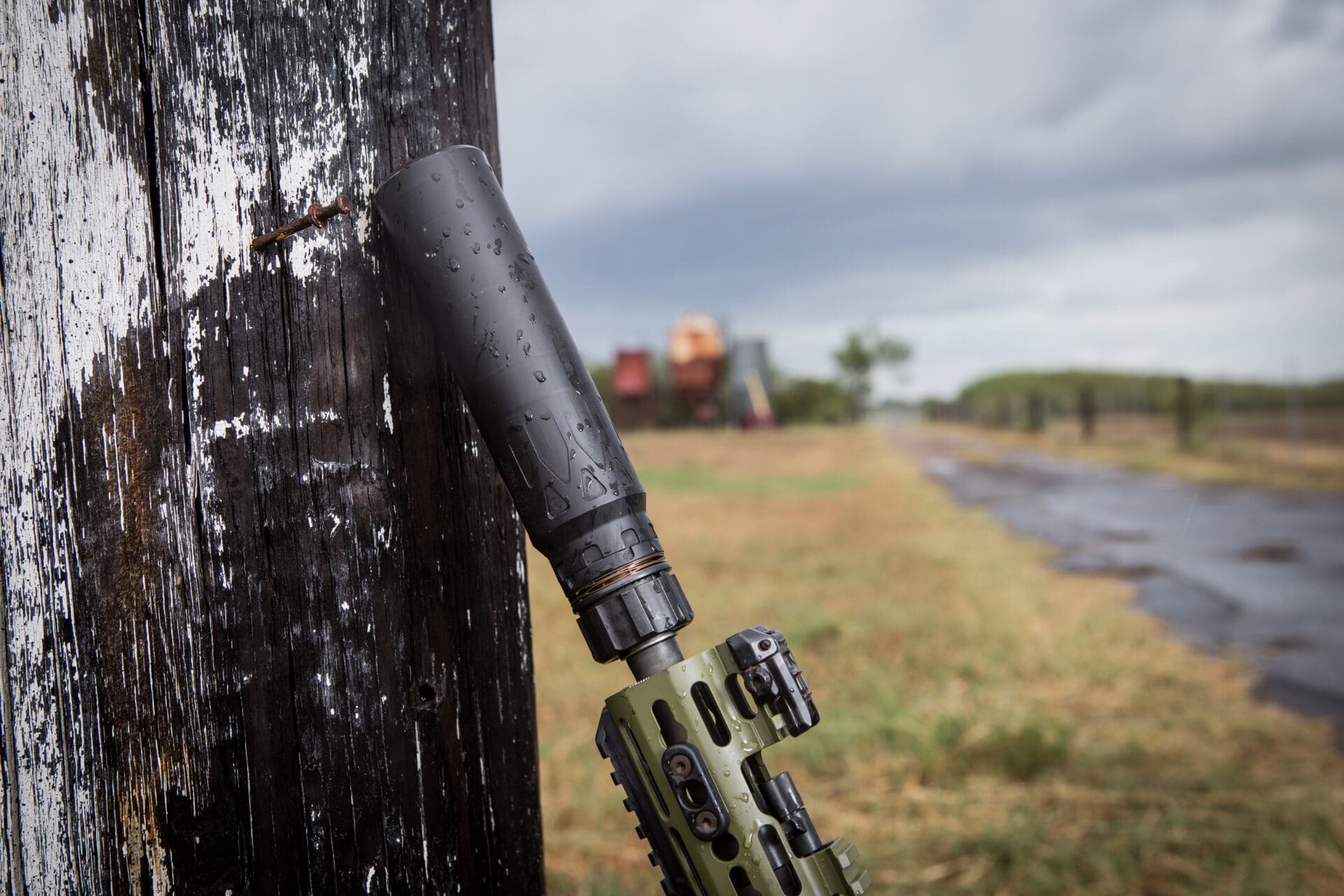
(via Ammoland.com)
One of the biggest news items in the gun world of late: suppressors and the National Hearing Protection Act. For those not following the news, the NHPA would remove suppressors – a.k.a. “silencers” – from the list of heavily regulated devices, allowing one to purchase them without having to get the tax stamp from the ATF.
This is also the reason a number of people have a threaded barrel for their pistol, whether the threaded barrel goes in their concealed carry holster or not. But just how well do they work?
It’s worth looking at, as one of the biggest selling points of suppressors is that they attenuate noise. The typical gunshot produces 140 to 160 decibels of noise, which instantly damages hearing. Any noise above 140 dB produces instant hearing damage, so anything that brings a gunshot below that threshold is worth looking into.
Just Don’t Call Them Silencers
It’s a myth that suppressors make anything “silent.” A gunshot is still going to sound like a gunshot; it just might be somewhat quieter. That said, how well do they work?
The truth is there’s an economy of scale. Part of it comes down to the suppressor used – is it for the caliber you’re using or is it a generic design for multiple calibers, how long/short it is and how its made – as those factors make an impact. So does ammunition; supersonic ammunition, meaning that traveling at 1,125 miles per hour and faster, makes a sonic “crack” that subsonic ammunition does not. Ambient temperature, humidity and elevation also make an impact.
Put a bit more simply, how well a suppressor works on paper differs from how well it will work for YOU depending on a number of factors, so YMMV (your millage may vary).
A gunshot is still going to sound like a gunshot; it just might be somewhat quieter. That said, let’s try to come up with an average of sorts.
Looking at a few different products, SilencerCo. attests their suppressors reduce the sound pressure of a 9mm gunshot to anywhere from 125.7 dB to 131.5 dB, depending on the model. Advanced Armament Co, another popular supplier, attests a 23 dB to 33dB reduction or down to 127 dB. Liberty Suppressors, another manufacturer, attests a reduction of 24 dB to 38 dB, depending on model and other factors.
In short, we can presume something on the order of 30dB of attenuation as an average. Since the typical gunshot produces about 160 dB of noise, that means a suppressor will still lower the noise to 130 dB. It could be more or less – even much less, in some cases – but this is more of an average rather than for a specific make/model silencer for a specific caliber. You can argue amongst yourselves in the comments if you take umbrage.
Do suppressors work? I still use Ear Protection At All Times…
Presuming an average attenuation of 30 dB and sound level of 130 dB with a suppressor, you should still wear ear protection.
The louder the noise and the longer you’re exposed to the noise level, the more likely hearing damage becomes or the more permanent damage occurs. Hearing loss can be induced by being exposed to a constant 85 dB noise, which is why OSHA mandates 85 dB be as loud as workplaces get – even industrial ones – without mandatory ear protection.

Noises in excess of 120 dB – which is the sound pressure generated by a jumbo jet on tarmac from 100 yards away – can cause permanent hearing loss if exposure lasts just minutes; 15 minutes with a 115 dB sound system will damage your hearing. An afternoon’s shooting, even if attenuated to that low a sound pressure level, can still damage hearing permanently.
However, a pistol or rifle suppressed to 130 dB, with further attenuation from hearing protection, will be safer still.
So, to sum up, suppressors don’t “silence” a gun shot by any means. Though they can be effective and definitely reduce the overall noise level, they still generate – in most cases – sufficient noise to damage hearing. Thus, if you get one, make sure you use it with hearing protection as well.
About Sam Hoober
Sam Hoober is a contributing editor at Alien Gear Holsters, as well as for Bigfoot Gun Belts. He also writes weekly columns for Daily Caller and USA Carry.




CA resident. So the discussion is purely academic. Quail season starts next weekend. Normally I hunt with ear plugs. Not a very good solution. So now I have bought a pair of electronic muffs.
We’ll see how that works.
I think you’ll love hunting with e-muffs. I know I do. (Except on windy days).
I’m going to buy my fourth pair. Those things don’t seem to last very long.
They aren’t all that expensive. If they last a full season or two that’ll justify the expense. I added spare batteries to my vest for back up.
Good call on the spare batteries.
The truth about suppressors is…we need to focus on the SBR rule first, that’s the weakest link in the NFA. You can’t justify a ban on SBRs in a society that allows handguns and concealed carry. Get something done, instead of getting nothing done. Yes, I’d love to have suppressors off the NFA, but Washington is full of cockblockers…like Paul Ryan.
Thats 1125 FPS, not MPH.
I Noticed that too.
The speed in MPH is a less impressive 670.
The fake-science globalwarming for climate change idiot greenie-weenies are happy if you run a muffler on your motorized vehicles and equipment, even though NOTHING f’s with the efficiency and fuel consumption like a muffler. However, they are communist and buggered gun-grabber-y enough to not want to protect your hearing while you enjoy the environment.
Anything that reduces damage to my ears has to be a good thing. Ive ben playing the drums for over 40 years and always wore hearing protection while playing live. No so much in my 2-3 hours of playing at home daily in my youth.
I also have been shooting since Ive was 10 years old weekly.
I have to say I have NO hearing loss at all. If anything above average hearing.
My reason for wanting a suppressor is for shooting handguns. In an indoor range even with plugs and mufflers. I get the yips sometimes from the idiots next to me firing 44magnums.
My main thing is if the Hearing Act passes. Prices come down and even the idiot with the 44 magnum might just buy a suppressor. I know I know they don’t work on revolvers. Or maybe I should say work well. Even with a gap they would have to do some thing, right??
But it would be nice if all indoor shooters used them.
PS: Thanks for fixing the adding the info at least on my comment box……
I’m curious why the guy with the .44 magnum is an idiot. Is he some kind of asshole or do you just not like large caliber handguns and anybody who shoots one?
Which would make him an idiot asshole. If my math is correct.
I wear plugs and muffs when shooting indoors.
And the report of a 44magnum is negligible compared to my 22 jet.
Ill be looking the goober jumping like a rabbit the next time i shoot a 44 at an inside range.
Looks lime a drummer would be a little more accepting. Lmao
because he is in an indoor range. take the .44 to an outdoor range or out to a buddy’s property.
You are in other peoples space at the indoor.
Kinda like the morbidly obese individual not buying two seats on the plane and you are stuck next to them.
a
The .44M is morbidly obese.
A 30-06 is FAR louder than a .44 mag. Are you just one of those bitches that goes to a gun range and bitches about gun fire? Not everyone wants to only shoot 9mm and .223 you pussy.
Fantastic information for buying a suppressor.
I look forward to the future vids. Especially using a .30 cal suppressor on a .223 rifle.
I agree that the first important step is to get it away from the ATF and treat it like any other gun “furniture.” Then the manufacturers will have plenty of incentive to push the technology forward and offer plenty of options. Personally, I’ll wait until I can holster a gun with a suppressor and use it pretty much the same as I do my current daily carry gun… During a DGU would be the only time I’d really need a suppressor. Ear muffs work fine at the range.
The HPA/HUSH/SHARE acts are more personal for me as I have hearing damage in one ear from a negligent discharge, and since I shoot frequently I do my best to prevent any further hearing loss. Since I shoot indoors about 90% of the time I still wear hearing protection, typically doubled up (plugs and muffs), even with my suppressors. The few times Ive shot my pistols with my Dead Air Ghost 45m in 9mm and 45 with subsonic loads, it was still uncomfortably loud for me, but it was indoors and I’m more sensitive to loud noises now. I will also not shoot my 10.5in Ar15 without my Sandman-S on it! As a hunter as well Id love to be able to take my cans with me so I dont have to wear hearing protection while pushing hedgerows.
“We’re looking to roll back this ban on a health & safety device. Why insist that people hurt themselves, when they’re trying not to. Maybe criminal. Certainly dumb.”
“You’d have to ask the people behind it why they insist on damaging people’s hearing. It’s weirder even than that. This isn’t like mandated mufflers on cars, brakes on chain saws and similar — stuff people won’t do unless mandated. This is literally the opposite — something people want to do to protect themselves, that these particular authorities insist on prohibiting. It’s like they hate these people, or something.”
Who are you quoting? Yourself?
If one is to have a technical discussion, it would help to use technically correct terminology. There is no such thing as a “sound level of 125 dB”. The sound level is measured in dBM, a very different meaning. Decibel is a relative measure, expressed on a logarithmic scale. Without getting into the definition of logarithms, picture it as a multiple, 2X, 3X, etc. Saying that a gunshot is 3X, for example, is meaningless. It needs to be referenced to something. The standard definition is referencing the measured sound level (pressure) to the threshold of hearing (0 dBM, or 20 micro Pascals of pressure). An important part of any proper measurement is taking account of the distance of the measuring microphone from the source, as sound pressure decreases rapidly with distance. The standard is 1 meter, hence dBM. It is important to note (or verify) this measurement distance, as otherwise the measurement is meaningless. Just like when car stereo manufacturers advertise 1,000 Watt amplifiers that are incapable of 20 Watt outputs. Suppressors are expensive items, beyond most people’s ability to try and throw away bad ones. It would be proper for such expensive items to be properly tested and specified, according to accepted industry standards. Please don’t misconstrue any of the above as a call for government regulation; quite the opposite – an educated consumer, demanding proper disclosure of specifications and test results, is what I’m advocating.
Excellent information, thank you! I suspect that this suppressor thing will be no different than most other appliances and tools. Aside from the “you get what you pay for” thing, the expense of even low grade items will determine much about how effective they are at reducing noise and hearing loss. I asked a question months ago about how long these appliances would last, and now I understand that the answer is, “it depends.” Depends on lots of things, I’m sure, but the bottom line for me is that they would likely be expensive, even unregulated.
They would, then, more likely be kept and used long after their optimal effectiveness and the hearing loss might well be even worse unless people went back to using other, older forms of protection. And I have to ask why I’d want to put money into both.
I always assumed these measurements were in dB SPL but it kills me that nobody specifies the distance between the muzzle and the microphone.
Not sure what you’re on about with dBM = 1 meter. The unit dBm isn’t really associated with sound pressure level.
dBm (little m) is dB referenced to 1 mW, an electrical measurement. dBM is used as a sound pressure measurement, short for dB SPL at 1 meter. You are making a correct assumption, that is SPL (sound pressure level), measured at 1 meter from the source (muzzle, in this case). But without specifying, a manufacturer can play games and measure it wherever he wants. Also, the standard for the measurement is at 1 KHz, but the crack and blast frequencies are multi-spectral, and ear damage is certainly not the same across the frequency band. Here’s another possible complication, more applicable to rifles – your ear is close to the breech, but the measurement, we’re saying, should be done at the muzzle. The frequencies and SPL’s are surely different in those locations, given the very large relative distance difference to your ear. Seems like a field that could use some research…
Wake me when it applies to Massachusetts
enough about silencers and suppressors already
when are they going to pass NATSBRART2ARFMA
its the “national access to short barrelled rifles and restoring the 2nd amendment right for midgets act”
its like the americans with disabilities act except it guarantees access to rifles instead of swimming pools or toilets
the beauty of it is it makes short barrelled rifles legal even if youre not a midget
how long must midgets endure this oppressive law that rifles have to be too big for them
if we could only gain access to a rifle for even just one midget the whole thing would be worth it
I literally just got my Omega .30 in yesterday. Filed 1/4/17, received 9/23/17. Not great, but I’ll take 8 months over the projected 12 we’re currently seeing.
I’m in love. They’re expensive, but worth every penny. Would love to see the act pass as I now want one for every caliber lol. At the very least require a 30 day turnaround period and drop the price of the tax stamp. They have no problem cashing the check in 30 days.
I upland bird hunt. Like the 2 dudes in the picture with the suppressed shotguns. I only have experience with suppressed pistols.
Does suppressing a shotgun affect it’s swing and handling? Is steel shot OK for a suppressed shotgun?
Anybody with real world experience?
I have hunted with a SilencerCo Salvo 12, and I can say that it most certainly affects your swing. The things are very heavy at the end of a 26-30″ barrel. In my experience, they almost require a short barrel to use effectively for long periods of time. My last hunt, I used an 18.5″ barrel on my 870 and it brought the gun back to a normal “feeling” operation. Since suppressors act like barrel extensions, you generally get comparable velocity to a barrel of your current length + length of suppressor. I don’t have sights meant for this use, so I end up “imaging” the bead through the suppressor. Once you get used to it, it’s not bad really. As for steel shot, you shouldn’t have a problem with this particular suppressor. SilencerCo says it will work with any “wadded” shot.
P.S. Using a semi-auto shotgun with a suppressor is almost like shooting a 22. They significantly reduce recoil.
Reduced recoil? Suppressors just get better and better.
As I mentioned at the Ammoland article, articles that discuss firearm noise levels should relate the DB levels to sounds we are used to hearing, in order to make comparisons understandable to the reader.
Relate the decibel levels to the reports of various firearms. Does a suppressor reduce the sound of a .45 to that of a .22, for instance.
Not everyone is familiar with decibel level charts. Articles should provide the standard reference points in a chart.
I call them Silencers. Just as I’ve called them silencers for over 50 years. Maybe I can call them mufflers. Or I can call it Shirley.
And placed in my home-made, bolt action .45 acp carbine they are good enough for me to eschew hearing protection at my backyard range. Quiet enpough that you hear the striker hitting the primer and not much else.
Not always, but sometimes it can make your gun not sound like a gun.
Haha ha why are we still talking about suppressors. If anything is apparent none of the bills will ever even be allowed be brought to vote let alone pass. Keep dreaming I guess but there are more clowns in office now than ever before. …and it will only get worse.
Comments are closed.